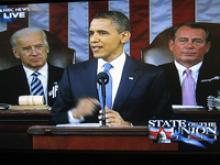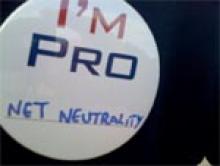Responding to Broadband "Goals" in Obama's SOTU Address
Wally Bowen, the Founder and Executive Director for the Mountain Area Information Network in Asheville, North Carolina, wrote the following piece after President Obama's State of the Union Address. He gave us permission to reprint it below.
Last night in the State of the Union address, President Obama called on Congress to help “win the future” by, among other things, rebuilding America's infrastructure.
On broadband Internet access, the president was unequivocal: wireless broadband is the way forward (item #1 below).
However, he did not mention the FCC's recent approval of “open Internet” protections that are widely believed to be unenforceable. Indeed, just a few days ago Verizon filed suit to invalidate these rules via a preemptive, knockout blow.
Congress is not likely to pass any meaningful net neutrality/open Internet rules. This means that the Internet is completely exposed to “corporate enclosure” by a handful of cable and telephone companies and their business partners (Apple, Google, FaceBook, et al).
Our only alternative for preserving an open Internet -- and the freedom to innovate and use applications of our own choosing -- is the creation of non-commercial, community-based broadband networks (item #2 below).

Fortunately, Asheville and WNC are ahead of the game with our nonprofit fiber networks (ERC Broadband, Balsam West, French Broad EMC, et al.) and nonprofit wireless networks like the Mountain Area Information Network (MAIN).
The way forward will be difficult. While the commercial carriers have been somewhat tolerant of nonprofit “middle-mile” fiber networks, they view nonprofit “last-mile” providers of broadband service to homes and businesses as “unfair competition.”
Indeed, 15 states have already passed laws – pushed by cable and telco lobbyists – to prohibit “last-mile” municipal broadband networks. A similar law was attempted, but tabled, in the last two sessions of the N.C. General Assembly. This law will no doubt re-appear in the upcoming session.






